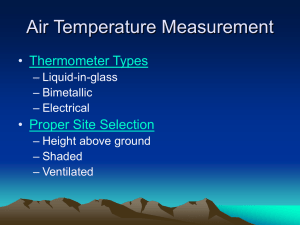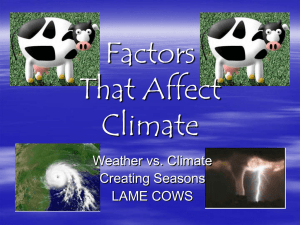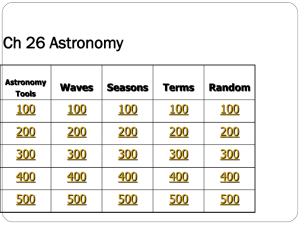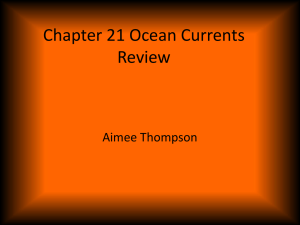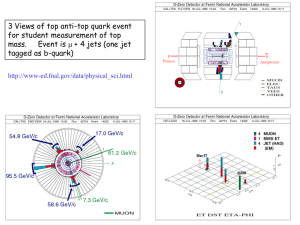Alfredo T. Suzuki
advertisement
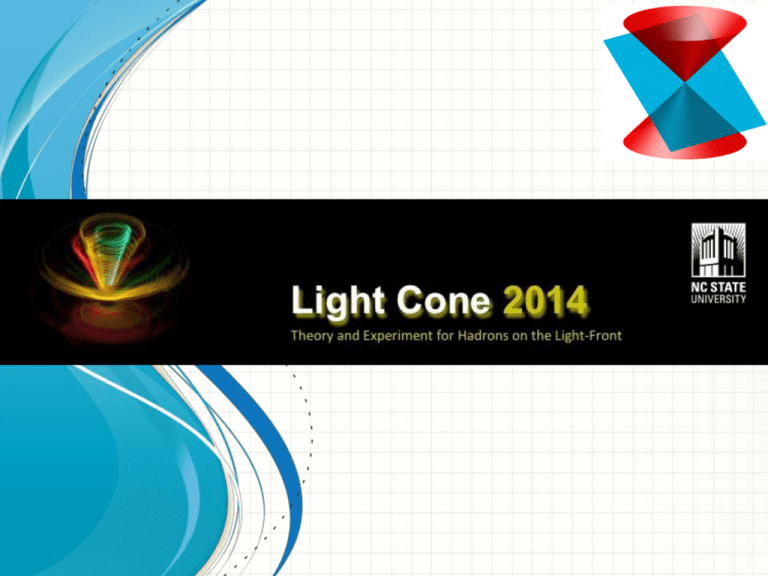
LIGHT CONE 2014 THEORY AND EXPERIMENT FOR HADRON ON THE LIGHT FRONT NCSU - RALEIGH, NC - MAY 26 - 30, 2014 Zero Mode Effects for the Electromagnetic Currents in the Light Front: Fermion Case A.T.S. - IFT/UNESP, SAO PAULO, SP - BRAZIL J.H.O.SALES, UESC/PPGMC, ILHEUS, BA - BRAZIL G.S.SANTOS, UESC/PPGMC, ILHEUS, BA - BRAZIL May 30th, 2014 • On “mass-shell” condition: k m 2 2 • In the light-front coordinates: 2 2k k k m 2 2 2 2k k k m 0 • Sign correlation: k 0 k 0; k 0 k 0. • Sign correlation would imply, in principle, a simpler light-front vacuum structure; • A “free lunch”? • Consider the bilinear 2 2k k k m2 • The “zero-mode” problem: • For m 0 : 2 2 k 0 k 0 photon in its rest frame • ! For m2 0 : k 0 2 2 m k tachion ? LC2014 1. Zero Mode Effects for the Electromagnetic Currents in the Light Front: Fermion Case J.P.B.C.de Melo, J.H.O. Sales, T. Frederico and P.U. Sauer Nucl.Phys. A 631, 574c (1998) Covariance of EM current - order g0 - is recovered when in the J- component we consider the pair production term (Pole dislocation technique) 2. J.H.O.Sales and A.T.Suzuki Int. J. Theor. Phys. 48: 2340–2352 (2009) We identified the propagator of the antiparticle in the light front - orders g0 and g2 - (Propagator technique) 3. A.T.Suzuki, J.H.O.Sales and L.A.Soriano, Phys.Rev. D88 025036 (2013) Propagator technique: corrections to order gN and background field with m photons. LC2014 Zero Mode Effects for the Electromagnetic Currents in the Light Front: Fermion Case Propagator method - boson case k Order g0 Sg0 A S (k1 ) (q) S (k3 ) S (k 2 ) ext. m=- m = +,^ + LC2014 Zero Mode Effects for the Electromagnetic Currents in the Light Front: Fermion Case • The minus component of the propagator is S ( x x ) S ( x ) 3 1 S ( x ) ie dx A S1 ( x ) S ( x x ) S ( x 3 2 ) x x • In momentum space, dk ~ 2 S ( K ) dq F (q ) k ( K k )( K k 2 2 ) 2 i 2( K i k 2 ) q 2 2 2 m m i m i 3 i 1 2 K i k 2 k K k 2 ( K i k 2 ) k2 ( K k 2 ) • where K K q i iq x A dq F (q ) exp 2 K i ki k2 , q k3 k1 , K k2 k3 , m 2j k 2j m 2 , j 1, 2, 3. LC2014 Zero Mode Effects for the Electromagnetic Currents in the Light Front: Fermion Case • The minus component of the EM current is then built from the corresponding propagator - J » GO - + ^ (k2 ,k 2 ) G • with O - (k2+ ,k ^2 ) = ò dk2- 1 k2+ (K i+ - k2+ )(K + - k2+ ) 2(K i- - k2- ) + q ´ 2 2 2 æ ö æ ö æ ö m i e m i e m 1^ 2^ 3^ - ie k ç K i - k2 - + ÷ ç K - k2 - + + ÷ç + + ÷ (K i - k2 ) ø è k2 ø è ( K - k2 ) ø è LC2014 Zero Mode Effects for the Electromagnetic Currents in the Light Front: Fermion Case • The momentum integration is performed using Cauchy residue theorem in the • k 2 complex plane. There are two distinct regions for k 2 with q 0 : • a) 0 k2 Ki K ; • b) 0 Ki k2 K . LC2014 Zero Mode Effects for the Electromagnetic Currents in the Light Front: Fermion Case Order g2 LC2014 Zero Mode Effects for the Electromagnetic Currents in the Light Front: Fermion Case • For this case we have altogether 24 different regions of integration that – in principle – may give relevant contributions • Of these total, 14 yield vanishing contributions because all the possible poles in those regions locate either on the upper hemisphere or on the lower hemisphere. • Among the 10 non vanishing contributions, we emphasize only two of them just for illustration: LC2014 Zero Mode Effects for the Electromagnetic Currents in the Light Front: Fermion Case For region 3) 0 k 2 ki k 4 k f For region 12) 0 k f k 4 k 2 ki LC2014 Zero Mode Effects for the Electromagnetic Currents in the Light Front: Fermion Case Structure of integrands for zero mode manifestation: 1. Integration measure: 2. Propagator factors: 3. Legs of the type: dk dk 2 4 (q ) 2 dxdy 1 (ki k 2 )(k 2 )(ki k 4 )(k 4 )(k 4 k 2 ) 1 b c a cq dq 4 (q ) 4 4. Numerators of the type: ( A k 2,on ) ; (B k 4,on ) (q ) 0 1 5. Numerator of the type: (C k ) ; j ,on j 2 or 4 1 q 1 (q ) 4 LC2014 Zero Mode Effects for the Electromagnetic Currents in the Light Front: Fermion Case Structure of integrands for zero mode manifestation: For n intermediate bosons n 1 1. Integration measure: dk 3. Legs of the type: n 1 (q ) j 1 n 2. Propagator factors: 2j n 1 dx j j 1 n 1 1 j 0 ( k i k 2 j 2 )( k 2 j 2 ) j 1 ( k 2 j 2 k 2 j )( k f k 2 j 2 ) 1 b c a cq dq 2n2 (q ) 2 n 2 4. Numerators of the type: ( A k 2,on ) ; (B k 4,on ) (q ) 0 1 5. Numerator of the type: (C k ) ; j ,on j 2, 4, , 2n 2 1 q 1 (q ) 2 n 2 LC2014 Zero Mode Effects for the Electromagnetic Currents in the Light Front: Fermion Case Structure of integrands for zero mode manifestation: For general case n 1 1. Integration measure: 2. Propagator factors: 3. Legs of the type: dk 2j n 1 (q ) j 1 n 1 dx j j 1 1 (ki k 2 ) (k 2n 2 k 2n )(k f k 2n 2 ) (k f k 2 j 2 ) 1 b c a cq dq 4. Numerators of the type: ( A k 2,on ) ; 5. Numerator of the type: (C k j ,on ) ; 2nm2 (q ) 2 n m 2 (B k 4,on ) (q ) 0 1 j 2, 4, , 2n 2 1 (q ) m 1 (q ) 2 n m 2 LC2014 Zero Mode Effects for the Electromagnetic Currents in the Light Front: Fermion Case LC2014 Zero Mode Effects for the Electromagnetic Currents in the Light Front: Fermion Case The femion case The propagator for s spin ½ particle is related to the propagator of a scalar particle by S f ( x) (i m) S ( x) So that d 4k i (k m) ik x S f ( x) e 4 2 2 (2 ) k m i Now, the integrand factor can be decomposed as follows: (k on m) i (k m) 2 2 k m i 2k (k kon ) 2k Thus, the global propagator of two free fermions may be written as (k1on m) dk1 dk 2 ik1 x S(x ) e k12 m 2 i 2 2 2k1 (k1 2k1 ) 2 k1 ( k m ) 2 on k 2 m 2 i e ik 2 x 2 k 2 ( k 2 2 ) 2 k 2 2 k2 LC2014 Zero Mode Effects for the Electromagnetic Currents in the Light Front: Fermion Case In momentum space, with Fourier transform dk S (K ) 2 ( K k 2 )k 2 Where k jon (k1on m) ( K k 2 k1on K i k2 ) 2 (k m) 2 on i (k 2 k 2 on k2 ) 2 2 k j m2 2k Let us write the above as S 0 ( K ) S prop. ( K ) f ( ) LC2014 Zero Mode Effects for the Electromagnetic Currents in the Light Front: Fermion Case • Where (k1on m) (k 2 on m) dk S prop. ( K ) 2 ( K k 2 )k 2 ( K k 2 k1on K i k ) (k 2 k 2on ki ) 2 • There are two poles for the propagating term: • a) k 2 K k1on • b) k 2 k 2on i K k 2 i k 2 • HERE WE CAN TREAT FOLLOWING THE BOSON CASE. 2 LC2014 Zero Mode Effects for the Electromagnetic Currents in the Light Front: Fermion Case • The terms that contain one gamma plus are ìæ f (g + ) = ò ö + æ öü + k/1on + m ÷ æ g ö + æ g ö ç k/ 2on + m ÷ ï ý ç +÷ ç +÷ç ÷ ÷ i e i e K - k2 - k1on + + + ÷ è k2 ø è k2 ø ç k2 - k2on + + ÷ ï K -k2 ø k2 ø è îè þ dk2ïç + + íç (K - k2 ) ïç • These are the terms containing the instantaneous (non-propagating) terms • We are currently analyzing them to see what kind of contributions they will bring to the different components of the current. LC2014 Zero Mode Effects for the Electromagnetic Currents in the Light Front: Fermion Case Summary: • BOSON CASE: 1. For 2 free propagating bosons (no intermediate boson) interacting with 1 external photon: - All three l.f. components of the current manifest zero modes, but; - In the Breit reference frame, only the J minus component retains a non vanishing zero mode contribution. 2. For 2 propagating bosons with 1 intermediate boson and 1 external photon: - All three l.f. components of the current manifest zero modes, and - In the Breit reference frame, all three components of the current have vanishing zero modes. 3. For 2 propagating bosons with 1 intermediate boson and 2 external photons: - All three l.f. components of the current manifest zero modes, and - In the Breit reference frame: * Component J minus has non vanishing zero mode contribution and * Components J plus and J perp may manifest zero modes depending on the value of the photon momentum. * Zero mode manifestation depends on the number of external photons; * For a given number of external photons, the number of intermediate bosons MAY lead to the manifestation of zero modes, depending on the momentum of the external photon. LC2014 Zero Mode Effects for the Electromagnetic Currents in the Light Front: Fermion Case Summary: +,^,+,^,• For the fermion case:J fermion = J prop. + J +,^,+ g 1. The propagating part can be treated using all the technology developed for the boson case. Since the structure of the current is similar to the boson case, we expect that the number of intermediate bosons and the number of external photons will play an important role in the manifestation or not of zero modes. 2. We are currently in the process of tackling the terms with the “instantaneous” factor. This new feature may affect the overall picture drawn for the boson case. LC2014 Zero Mode Effects for the Electromagnetic Currents in the Light Front: Fermion Case THANK YOU!
